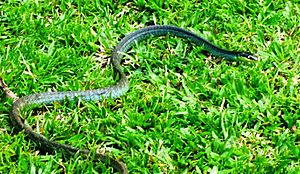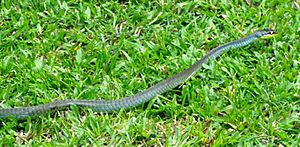Green tree snake facts for kids
Quick facts for kids Dendrelaphis calligastra |
|
|---|---|
 |
|
| Conservation status | |
| Scientific classification |
|
| Kingdom: | Animalia |
| Phylum: | Chordata |
| Class: | Reptilia |
| Order: | Squamata |
| Suborder: | Serpentes |
| Family: | Colubridae |
| Genus: | Dendrelaphis |
| Species: |
D. calligastra
|
| Binomial name | |
| Dendrelaphis calligastra (Günther, 1867)
|
|
| Script error: The function "autoWithCaption" does not exist. | |
Script error: No such module "Check for conflicting parameters".
The Northern Tree Snake (scientific name: Dendrelaphis calligastra) is a cool snake found in places like Indonesia, Papua New Guinea, and Australia. It's also known as the Green Tree Snake. This snake is thin and has big eyes. It's not venomous, so it's harmless to people.
Northern Tree Snakes are active during the day. They can grow up to 1.2 meters (about 4 feet) long. Their bodies can be green, brown, or grey. They have a cream or yellow belly, which helps identify them. You can also spot them by a wide, dark stripe that goes across their eyes.
About the Name
The scientific name Dendrelaphis calligastra has a special meaning.
- Dendrelaphis means 'tree Elaphe'. Elaphe is another type of snake. So, it tells us this snake lives in trees.
- calligastra means 'beautiful-bellied'. This name fits perfectly because of the snake's pretty cream or yellow belly!
Where They Live
Northern Tree Snakes live in tropical northern Queensland, Australia. You can find them from Paluma to Cooktown and in the eastern part of Cape York Peninsula. They also live in southern Papua New Guinea.
These snakes are very adaptable. They can live in many different places, such as:
- Rainforests
- Cities and towns
- Farm areas
- Open forests
They love to warm up in the sun. You might see them basking in the leaves of small bushes and trees. They are super fast and can quickly disappear through the tree branches if they feel threatened.
What They Eat
Northern Tree Snakes are carnivores, which means they eat other animals. Their favorite foods include:
- Frogs
- Other reptiles
Where They Are Found
This snake is quite common in the northern tropical parts of Queensland. You can also find them often in the eastern Cape York Peninsula.
Reproduction
Female Northern Tree Snakes lay eggs. They usually lay clutches of five to seven eggs at a time. One female was even recorded laying 11 eggs in January!
 | Shirley Ann Jackson |
 | Garett Morgan |
 | J. Ernest Wilkins Jr. |
 | Elijah McCoy |



